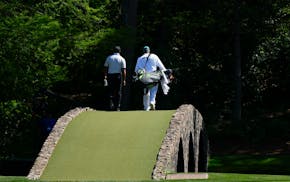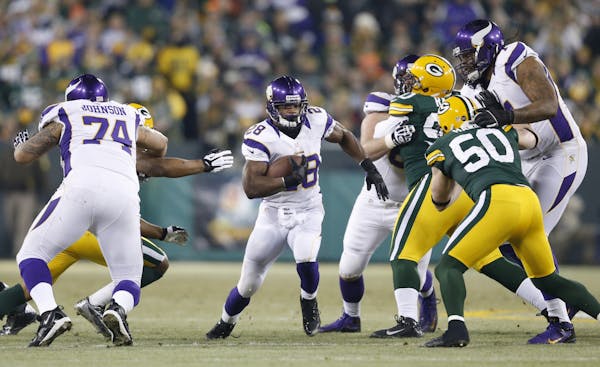GREEN BAY, WIS. - Bill Musgrave had a good year as Vikings offensive coordinator. He helped Adrian Peterson, the offensive line, Percy Harvin and, eventually, Christian Ponder play better than anyone should have expected.
Bill Musgrave had a lousy night as Vikings offensive coordinator. Forced by Ponder's injury to play Joe Webb at quarterback against the Packers in the playoffs, Musgrave abandoned the one strategy that could have kept the game close.
The Vikings' one chance on Saturday night was to play unconventionally, to turn Lambeau Field into a glorified bowl game with Joey Football running the option and frustrating a defense unprepared for him. Instead, the Vikings tried to match Aaron Rodgers with a rusty backup quarterback whose passing skills would not allow him to meet that challenge.
Most likely, the Packers, playing at home with one of the game's best quarterbacks on their side, were going to win the game regardless of how the opposing quarterback played, but the Vikings hinted early that they could compete if they thought creatively.
On the first drive, Webb took off on designed runs or option plays, Peterson took advantage of a disoriented defense, and the Vikings drove 53 yards for a field goal.
After that, Musgrave asked one of the fastest quarterbacks in the game to stand still.
The results were disastrous.
When Webb took off on designed runs or ran the read option with Peterson, the Packers looked confused and physically overmatched, much as they did when Peterson bludgeoned them in the first two meetings this season between these teams.
When Webb dropped into the pocket, he threw more unexpected bounce passes than Ricky Rubio.
On the Vikings' first 11 offensive plays, they ran the ball 10 times, gaining 66 yards, with Webb gaining 33 on three runs.
On their next 19 plays, spanning the rest of the first half, they ran the ball six times. Webb ran the ball once, and it was on a scramble, not a designed carry. They gained 31 yards the rest of the half.
"We tried to hit them with some different plays, tried to switch it up," Webb said. "Coach Musgrave had a good game plan. It was a learning experience for the coaches as well as the players."
Webb did not say this with an edge, but asked about the running success on the first drive, he said: "It was successful. That's Coach Musgrave's decision, and if he wanted to go another route, I'm all for it."
After that impressive first drive gave the Vikings a 3-0 lead before they had completed a pass, the Vikings suddenly made like Air Coryell. Webb threw high. He threw low. He threw too long. He panicked.
With Webb shortening drives with his inaccuracy, Peterson, after the first drive, never had a chance to dominate the game. After rushing for 210 and 199 yards in the first two games against the Packers this season, Peterson finished with 99 Saturday.
In the first half, Webb produced 6 net yards passing and 43 net yards rushing. He averaged a half-yard per passing attempt and almost 11 yards per rushing attempt.
When Ponder couldn't play, the Vikings had one strategic advantage: The Packers hadn't game-planned to stop Webb's running, and were sure to be shocked at how hard he is to tackle. The Vikings erased their own strategic advantage.
"We mixed some of those read-options in along the way, but at some point you'd like to be able to complete some passes," Vikings coach Leslie Frazier said. "Early on, we did have them a little bit off-balance, but we had some opportunities in the passing game and just didn't connect."
That's exactly the point. The Vikings' chances of winning at Lambeau on Saturday with a backup quarterback were slim and none.
Slim involved running the ball down the Packers' throats with Peterson and Webb, and controlling the clock, and beating the Packers at a game they never intended to play.
Jim Souhan can be heard Sundays from 10 a.m. to noon and weekdays at 2 p.m. on 1500-AM. His Twitter name is SouhanStrib. jsouhan@startribune.com

Souhan: This is KAT's chance to prove Flip Saunders was right

Souhan: Why Tiger Woods should keep swinging
Souhan: Scheffler wins Masters again, shows what makes him special
Morikawa falters in final round at Masters


